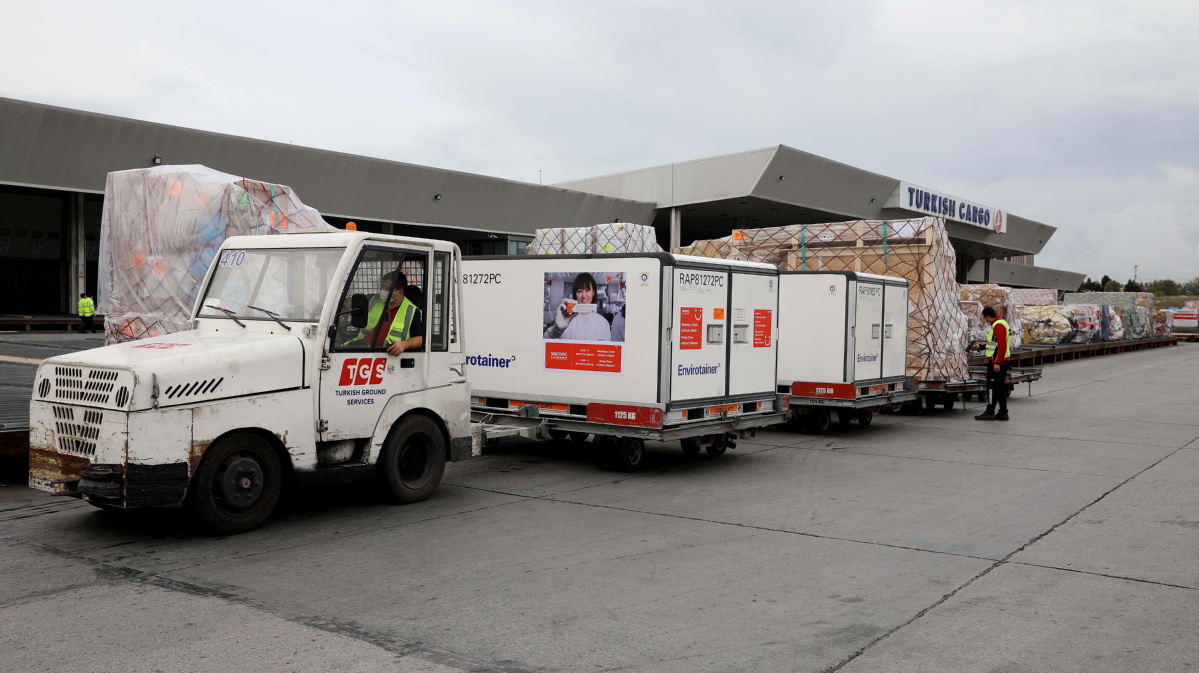Airlines stepping up to plate in vaccine delivery


Continuous enhancement of air cargo transportation technologies, better air-ground coordination raise efficiency
With more breakthroughs made in the research and development of vaccines to fight the novel coronavirus, a new challenge of transporting vaccines efficiently and safely has emerged, and a niche has developed within the air cargo industry.
In late November, the International Air Transport Association released suggestions on how to ensure that the air cargo industry is prepared to support the large-scale handling, transportation and distribution of COVID-19 vaccines.
"If each of the 7.8 billion people in the world needs one vaccine dose, it is expected that 8,000 fully-loaded Boeing 747 freighters will be needed to transport them," said Cai Guoxian, IATA North Asia's regional head of member and external relations, thus providing an estimate of the scale of carrying space needed to perform such a historic feat.
"In addition to the scale of transport capacity, several factors need to be considered in the process of vaccine transportation. Temperature, equipment, qualified operators, monitoring capacity, connectivity and supply chain integrity are all key factors that need to be taken into account," Cai said.
German biotechnology company BioNTech SE and Shanghai Fosun Pharmaceutical (Group) Co Ltd jointly announced on Nov 25 that their lead COVID-19 vaccine candidate BNT162b2 will be evaluated in phase 2 clinical trials to support future biologic license applications in China.
US biotech company Moderna announced on Nov 16 that its vaccine is 94.5 percent effective against COVID-19, making it the second vaccine in the United States to have a high success rate. Moderna's vaccine can be kept viable at -20 C.
Earlier, Pfizer announced its vaccine is more than 90 percent effective against the disease, and the vaccine has to be kept at-70 C.
SF Pharmaceutical, a subsidiary of logistics giant SF Express, China's leading air cargo carrier, has been gearing up to transport vaccines once the products hit the market.
As of mid-November, SF Pharmaceutical added 70 new refrigerated trucks specifically for medical product transportation, and the total number of such vehicles stood at 310. It also added new facilities for vaccine storage.
"The company has independently developed an information system that can help track the transportation and distribution path of vaccines and monitor temperatures," said SF Pharmaceutical.
"In addition, the system connects with the monitoring platform of the National Medical Products Administration, and thus it will be able to provide cold-chain storage and transportation services with quality tracing during the whole process," the company said.
SF Pharmaceutical added that with its extensive experience and an ability to integrate domestic and foreign transportation resources, it has the capability to transport room-temperature drugs, drugs that require cold-chain transportation and other medical devices. It can carry out cross-border rapid delivery of biological products via direct flights, the company said.
SF Airlines said China's air cargo transportation technologies and air-ground coordination capabilities must be continuously enhanced to raise delivery efficiency.
"Time slots are critical resources for aviation cargo transportation and its quality growth, and a pool of slots for cargo should be established independently and separately alongside slots for passenger flights to promote efficiency," said Huang Hui, vice-president of SF Airlines.
Meanwhile, Shanghai-based State-owned China Eastern Airlines said it is examining relevant standards for vaccine transportation to effectively prepare for further distribution.
Reflecting on the complexity of transportation challenges, the IATA provided recommendations for governments and logistics supply chains to better prepare for what will be one of the largest and most complex global logistics operations ever undertaken.




































